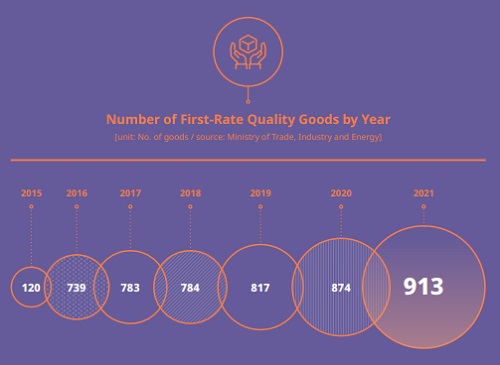O Korei
The government is committed to diversifying export items and enhancing their quality through the annual selection of first—rate quality goods. The project, which began in 2001 with 120 items and 140 companies, expanded to 817 items and 917 companies in 2019 and 913 items and 1,027 companies in 2021. The proportion of small and medium-sized businesses increased from 37% in 2001 to 76% in 2021, which contributes to enhancing their brand images and facilitating their entry into the global market.
Information technology (IT) is the strongest element of the country’s economy, and a significant contributor to Korea’s elevated standing on the global scene. The IT sector encompasses a wide range of skills from management innovation and administrative reform to computer software, the Internet, multimedia, and communication devices. The country’s well-established communication infrastructure was further enhanced with a 4G nationwide network; 5G (fifth-generation wireless technology) mobile internet services were already on offer in April 2019. The nation hyper-speed internet networks, which are the envy of many developed countries play a pivotal role in ensuring faster distribution of knowledge and information in Korea. Furthermore, its globally competitive memory and semiconductor sectors, led by Samsung Electronics and SK Hynix, serve as a sturdy pillar for the country’s economy, even amid the global economic and security crises. Korea is also renowned for its automobile production capabilities.
In 2021, the country ranked 5th in the world, with the number of cars produced reaching 3.46 million. Additionally, the country boasts global competitiveness in other industries, such as steel, chemicals, and shipbuilding.
The government proposed a blueprint to position itself as a leading country in the Fourth Industrial Revolution through the policy task, “A Nation with Innovative Startups Leading the Fourth Industrial Revolution.” As part of such efforts, the Fourth Industrial Revolution Committee focused on creating an ecosystem that facilitates market access through new ICT technologies and services. The committee also serves as a strategic platform that prepares for the nation’s future through regulatory reform, basic research, human resources development, and strategic investment in future industries. As a result, Korea secured the second spot in the 2020 Bloomberg Global Innovation Index, maintaining its position in the top three for nine consecutive years since 2012.

Information technology (IT) is the strongest element of the country’s economy, and a significant contributor to Korea’s elevated standing on the global scene. The IT sector encompasses a wide range of skills from management innovation and administrative reform to computer software, the Internet, multimedia, and communication devices. The country’s well-established communication infrastructure was further enhanced with a 4G nationwide network; 5G (fifth-generation wireless technology) mobile internet services were already on offer in April 2019. The nation hyper-speed internet networks, which are the envy of many developed countries play a pivotal role in ensuring faster distribution of knowledge and information in Korea. Furthermore, its globally competitive memory and semiconductor sectors, led by Samsung Electronics and SK Hynix, serve as a sturdy pillar for the country’s economy, even amid the global economic and security crises. Korea is also renowned for its automobile production capabilities.
In 2021, the country ranked 5th in the world, with the number of cars produced reaching 3.46 million. Additionally, the country boasts global competitiveness in other industries, such as steel, chemicals, and shipbuilding.
The government proposed a blueprint to position itself as a leading country in the Fourth Industrial Revolution through the policy task, “A Nation with Innovative Startups Leading the Fourth Industrial Revolution.” As part of such efforts, the Fourth Industrial Revolution Committee focused on creating an ecosystem that facilitates market access through new ICT technologies and services. The committee also serves as a strategic platform that prepares for the nation’s future through regulatory reform, basic research, human resources development, and strategic investment in future industries. As a result, Korea secured the second spot in the 2020 Bloomberg Global Innovation Index, maintaining its position in the top three for nine consecutive years since 2012.

